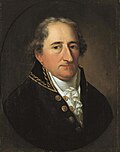Dérogeance ("derogation (of nobility)") was grievance for persons who did acts deemed unworthy of the noble status. A consequence of dérogeance was loss...
3 KB (311 words) - 20:48, 13 May 2022
needed] The rank of noble was forfeitable: certain activities could cause dérogeance (loss of nobility), within certain limits and exceptions. Most commercial...
43 KB (5,232 words) - 16:37, 3 October 2024
peasant or the peasantry in the case of the bourgeois. The principle of "dérogeance" disappeared. The peasants were allowed to travel freely and set up home...
98 KB (13,556 words) - 22:57, 2 October 2024
status of a person. That should be distinguished from the concept of dérogeance ("derogation" of nobility), which, for example, in the context of French...
2 KB (276 words) - 19:48, 8 July 2023
stripped of his nobility in the early 17th century, allegedly for the dérogeance of having acquired some farms in the Pays de Marsan. He was the son of...
43 KB (4,703 words) - 03:05, 15 April 2023
extensive personal archiving and archive research among Polish nobility. Dérogeance Norman Davies, God's Playground, [1] Semkowicz, W. (1900). Nagana i oczyszczenie...
4 KB (394 words) - 05:08, 16 August 2024
opposed to the Continent, where one observes that the legal penalty for dérogeance resulted in the legal loss of nobiliary status due to the failure of someone...
66 KB (10,414 words) - 10:43, 2 August 2022
12 May 1616, probably shortly before 16 July 1613, allegedly for the dérogeance of acquiring some farms in the Pays de Marsan,[citation needed] in present-day...
67 KB (7,020 words) - 12:46, 30 August 2024



